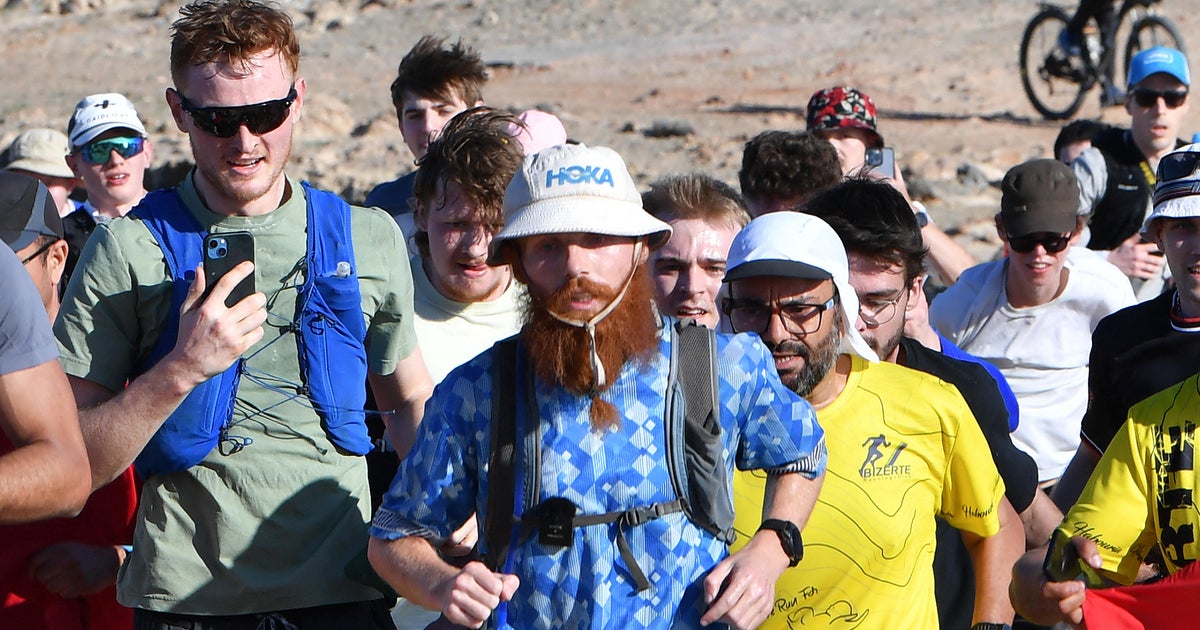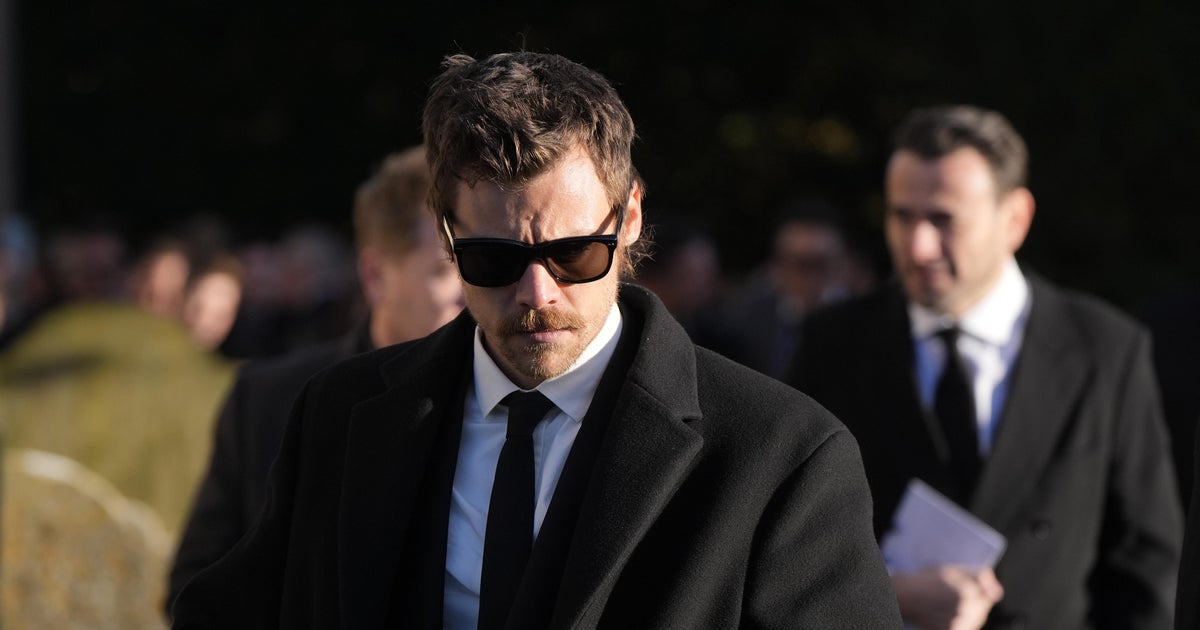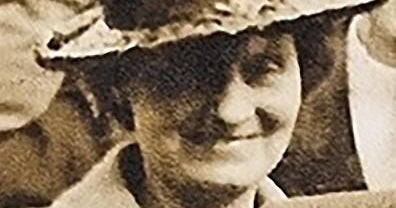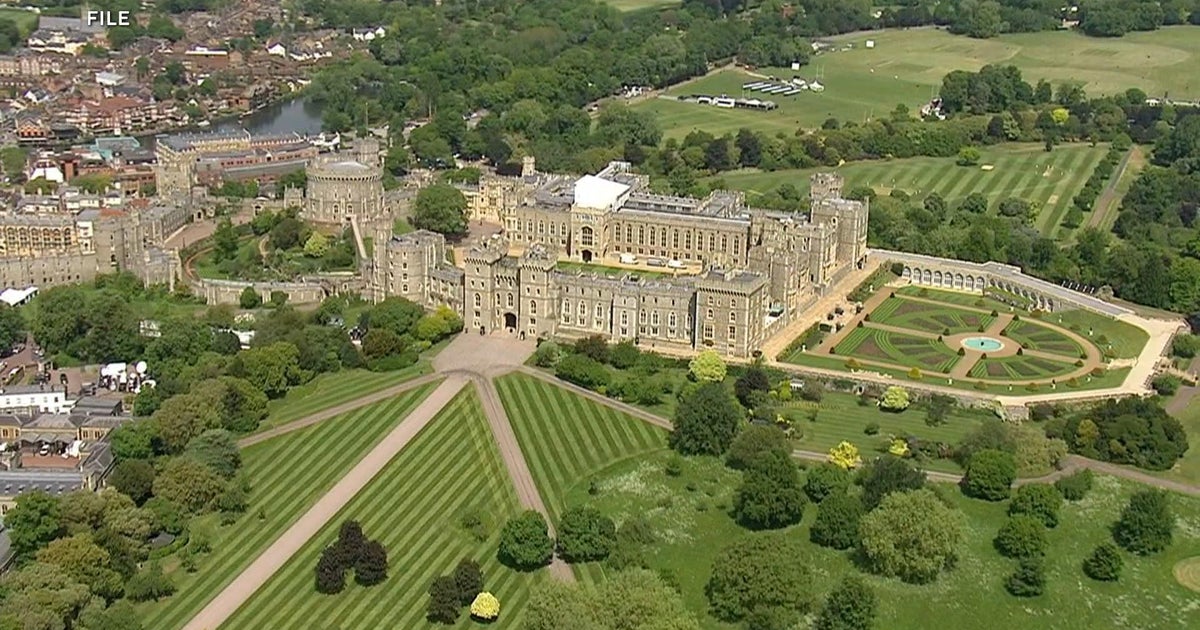CBS News
Russ Cook, Britain’s “Hardest Geezer,” runs length of Africa in 10,000-mile epic quest for charity

London — A British man has taken the concept of running for charity to a whole new level. Russ Cook, 27, completed a year-long quest Sunday to run the length of Africa.
After running through 16 countries in 352 days, true grit and perseverance fueled Cook over the finish line in Tunisia on Sunday. The Englishman — who calls himself the “Hardest Geezer” — ran about 10,000 miles in total, from the southern to the northern coasts of the continent, braving thieves, kidnappers and the elements as he traversed jungles, deserts and everything in between.
Cook faced an armed robbery in Angola, where bandits stole his and his team’s money, passports and equipment at gunpoint. He was nearly stopped in his tracks by the lack of a visa to enter Algeria, but diplomats at the country’s embassy in London managed to secure the necessary paperwork in time.
FETHI BELAID/AFP/Getty
The most frightening part of the trip, however, was being kidnapped briefly.
“Scariest moment was in the Congo, when I was on the back of a motorbike, thinking I was about to die,” he said in a social media post after crossing the finish line. “Getting driven into the jungle, yeah — that was pretty nuts.”
The Brit documented his dangerous and draining feat of endurance via his Instagram feed, where he tried to convey the rigors of running across the vast continent.
“Getting hit with another sandstorm this morning — sucking oxygen, chewing sand for breakfast,” he said in one post. “They’re tryin’ to get me gone but they just can’t.”
Cook used his social media posts to invite people from across the world to join him on his journey, and American Blake Warren told CBS News he was lying on his couch one Sunday afternoon when he came across a post and then made a snap decision.
“I saw it and he said everybody can come. I literally got on Skyscanner, I looked for a ticket and, 20 minutes later, I bought the ticket and here I am,” he said, speaking to CBS News from Tunisia.
“I just couldn’t miss a crazy historic opportunity like this,” Warren said after taking part in the last leg of Cook’s epic run.
The Englishman has raised almost $1 million for homeless young people and clean water for Africa — as well as a possible place in the record books.
But while Cook claims to be the first person to ever run the entire length of the African continent, the World Runners Association insists that one of its founders did it first in 2010. Cook argues that his trek was longer.
He ended his run by taking a dip in the Mediterranean – and downing a strawberry daiquiri to mark his sweet success.
CBS News
Here Comes the Sun: Jack Antonoff and more

Watch CBS News
Be the first to know
Get browser notifications for breaking news, live events, and exclusive reporting.
CBS News
Capturing Moriah Wilson’s Killer – CBS News

Watch CBS News
Be the first to know
Get browser notifications for breaking news, live events, and exclusive reporting.
CBS News
How to watch the Minnesota Vikings vs. Chicago Bears NFL game today: Livestream options, more

Getty Images
The Minnesota Vikings will take on the Chicago Bears today. The Vikings are currently 8-2, an impressive run so far this season, and will be looking to add a fourth win to their current streak after last Sunday’s 23-13 win against the Tennessee Titans. The Bears, on the other hand, are entering this game on the heels of a four-game losing streak after a tough 20-19 loss against the Green Bay Packers last Sunday.
Here’s how and when you can watch the Vikings vs. Bears game today, whether or not you have cable.
How and when to watch the Minnesota Vikings vs. Chicago Bears
The Vikings vs. Bears game will be played on Sunday, November 24, 2024 at 1:00 p.m. ET (11:00 a.m. PT). The game will air on Fox and stream on Fubo and the platforms featured below.
How and when to watch the Minnesota Vikings vs. Chicago Bears game without cable
You can watch this week’s NFL game on Fox via several streaming services. All you need is an internet connection and one of the top options outlined below.
Fubo offers you an easy, user-friendly way to watch NFL games on CBS, Fox, NBC, ABC, ESPN, and NFL Network, plus NCAA football channels. The Pro tier includes 200+ channels and unlimited DVR, while the Elite with Sports Plus tier adds NFL RedZone and 4K resolution. New subscribers get a seven-day free trial and all plans allow streaming on up to 10 screens simultaneously.
You can watch today’s game with a subscription to Sling’s Orange + Blue tier, which includes ESPN, ABC, NBC, and Fox. The plan offers 46 channels with local NFL games, nationally broadcast games and 50 hours of DVR storage. For complete NFL coverage, add Paramount+ to get CBS games, or upgrade with the Sports Extra add-on for additional sports channels like Golf Channel, NBA TV and NFL RedZone.
Watching NFL games, including Fox broadcasts, is simple with Hulu + Live TV, which includes 90 channels, unlimited DVR storage, and access to NFL preseason games, live regular season games and studio shows. The service includes ESPN+ and Disney+ in the subscription.
Want to watch today’s game live on your smartphone? If so, NFL+ streaming service is the solution you’re looking for. It lets you watch NFL Network and out-of-market games on mobile devices, with an upgrade option to NFL+ Premium that includes NFL RedZone for watching up to eight games simultaneously. Note that NFL+ only works on phones and tablets, not TVs.











